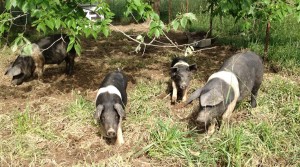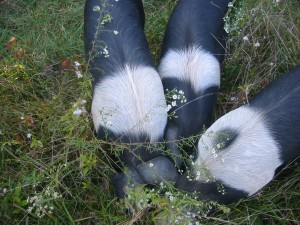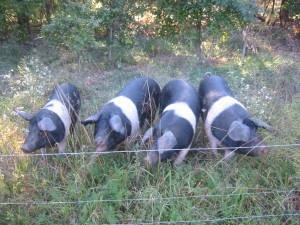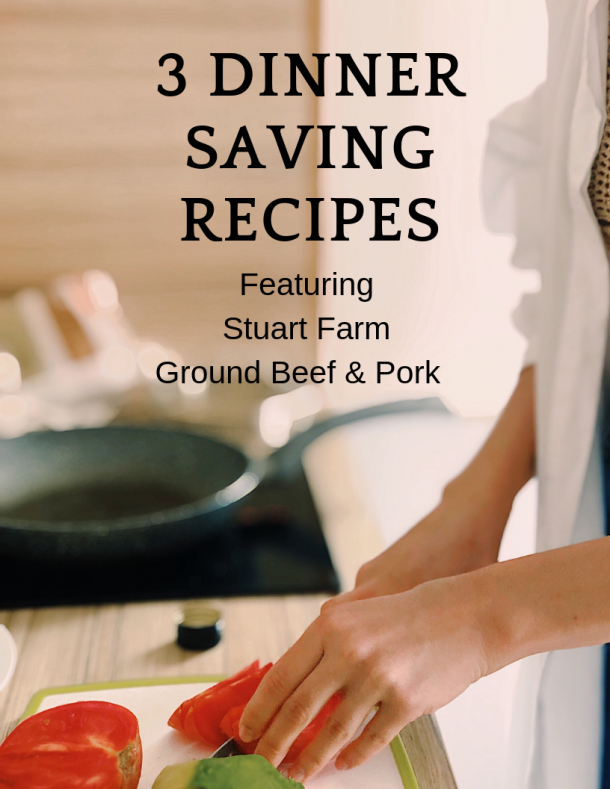
Big A, Princess, Dot, and DT
We came upon this breed by chance. The farm we bought our American Milking Devons from raised them, and on a tour of the farm, we decided we would get a few when we came back to pick-up our cow/calf pair. The Wessex Saddlebacks (WS) is not only an old heritage breed, but a rare one. Almost extinct in their native England, there is a huge effort in Australia and New Zealand to preserve the breed. There is one farm, Flint Hill Farm, here is Missouri that is one of the few breeders in America. The WS are a hardy breed of pig. They do well foraging on pasture and were mainly bred for their excellent bacon and hams.
We decided to get 4 weanlings, 2 gilts (girls) and 2 boars (boys). With the help of my vet sister-in-law Kathleen, we castrated the boars ourselves, turning them into barrows. I don’t think we will do that again. One, it is stressful for all involved. Two, I am not sure if it necessary to get rid of the boar taste or “taint” as it is called. The next pigs we get, we will leave them intact and see what happens. Supposedly, raising them on a more pasture based system, which we are working towards, lessens the risk of taint. People with mature breeding boars have butchered with no problems. Third, it is a a lot of stress for me to do post-op care. I was constantly checking to make sure they were healing well. The incisions are pretty well healed up after a week, but a week of fretting over it is too much for me.

We set the pigs up in a good sized paddock attached to our potbellies pen with a small house for them. I have never raised pigs before. Fred has experience with it, but I sort of took over the pigs at the beginning. I fed and watered them. I scratched them, picked off ticks, monitored their poops, check eyes, ears, and tails to make sure all was well. A pig with a curly tail and clear eyes is a happy pig. A straight tail and runny eyes means something is wrong. They got used to the daily checkups easily. As they got older, I would check them once or twice a week. I talked to them and watched them. I trained them to come when I clapped my hands repeatedly.
Before they grew too big, we moved them into a new pasture with an old pond. We ran 3 strands of electric wire around a large paddock that had big cedars and a walnut grove. They loved running about the trees and lounging in the pond. When there wasn’t much rain, Fred would take buckets of water down to make sure they had mud to cool down in. And even though it is frowned upon, I named them. Everyone says you shouldn’t name an animal you will eat. I think part of treating them with respect is acknowledging their individua

So, there is Dot,
Double Trouble (DT),
A-hole or Big A,
and Princess.
Dot is pretty obvious with the dot on her shoulder. Double Trouble, because he had the black and white double stripe on his shoulders. A-hole, because he is an a-hole to the others; always pushing and shoving. I never thought I would name anything Princess, but she was the first to let me scratch her, loved to be rubbed on and snuggle up to me.
Five months after we brought them home, it was time to butcher. We wanted to do it ourselves. Well, I wanted to do it ourselves. Just like with the chickens, I don’t like passing that task off to a stranger. However, with the new house, chickens left to butcher, fencing to be put up, and family commitments, it just wasn’t going to happen. After talking to and visiting a couple of processors, we chose one to use. We moved the trailer into the paddock and started feeding them in there. By the time the day rolled around, they went into the trailer easily. At the processor, I rubbed on Big A as we waited to unload. I started to cry a bit. It’s never easy. But I think if we had done it on the farm, in some way it would have been a bit easier.
I loved having the pigs. And next year we will get more. And next year we will butcher on the farm, that is for sure.
